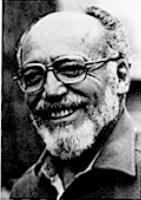Posts tagged ‘Leadership Development’
The Theorists – Bob Tannerbaum
There are a number of individuals who throughout the history and emergence of Organization Development have made a significant contribution to both the academic theory and practice of the field of OD.
Bob Tannerbaum in Brief
Bob Tannenbaum humanist vision profoundly affected the field of organizational development for more than 50 years, starting from a deep-seated belief about the importance of personal consciousness and the capacities of people to grow themselves psychologically, with derivative payouts in interpersonal sensitivity, Tannenbaum’s work was a forerunner contributor to considerations of human capital as a corporate asset.
From the 1950s through the 1970s, he was instrumental in establishing UCLA’s Graduate School of Management as a key centre of thought and practice in the fields of organization development and leadership training. During this period he helped found the Western Training Lab, which promulgated a derivative of T-groups that became known as Sensitivity Training, and played an important role in the evolution of the NTL Institute of Applied Behavioral Science, which spearheaded the drive to utilize group dynamics as an important pedagogy for promoting increased awareness of self and impact on others as essential to team play in the corporate environment.
Bob Tannenbaum’s intellectual work described organizational systems not as machines with interchangeable human parts, but as living communities that can be designed to enable people to grow and learn while achieving business goals. His writings, as well as his teaching and consulting, reflected the value he placed on people, and his belief that, to a great extent, leadership effectiveness derives from awareness of one’s own basic assumptions about human nature and the testing out and revision of those assumptions.
Bob Tannerbaum – Life and Times
- 1916 – Born Cripple Creek Colorado
- 1935 – Achieved an A.A. degree from Santa Ana Junior College
- 1937 – Received an A.B. degree in business administration at the University of Chicago
- 1937 – Instructor in Accounting at Oklahoma A&M College
- 1938 – Received an MBA in Accounting at the University of Chicago
- 1939 – Began Ph.D Studies in Industrial Relations
- 1942 – Enlisted in Navy as Officer in Pacific teaching Radar
- 1945 – Married Edith Lazaroff
- 1946 – Return to Chicago to Finish his Doctorate
- 1948 – Completed Ph.D
- 1948 – Joined UCLA -The Anderson School as Acting Assistant Professor and Assistant Research Economist
- 1958 – Published Journal Article How to Choose a Leadership Pattern
- 1960 – Published Journal Article
- 1961 – Published Leadership and Organization
- 1973 – Published Journal Article
- 1977 – Retired as Professor of Human Systems Development to concentrate on consulting and counselling executives.
- 2003 – Died
Tannerbaum – Key Contributions
Pioneer in the West Coast movement that valued personal development and teamwork as instrumental to organization effectiveness.
Tannenbaum’s work from the 1950s to the 1970s with Western Training Lab and the NTL Institute of Applied Behavioral Science was considered crucial to the development of modern small-group processes such as “sensitivity training” and “T-groups.”
First to describe a leadership continuum ranging from an autocratic manager — “the leader makes the decision and announces it to the group” -to a more democratic process in which employees are deeply involved in decision-making.

